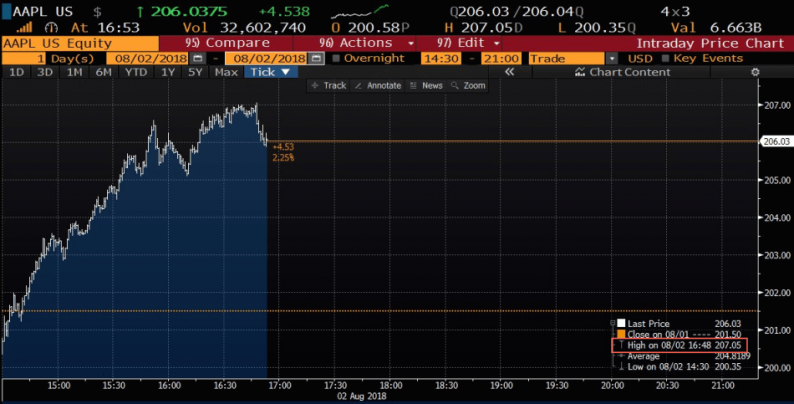Apple achieved the $1 trillion market cap mountain this week and folks were falling all over themselves to write and read stories about how the company achieved this milestone. That’s fine to the extent it gives us an excuse to reflect on one of the most remarkable stories in the history of corporate America, just as long as everyone remembers that nothing “changed”, per se, at 11:48 AM, New York time on August 2.

(“The Moment”, Bloomberg)
Any and all stories with “Apple” and “$1 trillion” in the headline dominated news feeds on Thursday and Friday, a somewhat ironic turn given how the week started for tech and for what it’s worth, Goldman thinks investors are asking “the wrong $1 trillion question.”
If you’ve been following along for the past several years and if you kept track of what helped ensure that U.S. stocks remained relatively resilient in the first half of 2018 despite trade-related turmoil abroad, then you probably know what Goldman thinks the “correct” $1 trillion question is. Hint: it’s buybacks.
“Repurchase authorizations have surged by 80% YTD and now total $754 billion”, the bank writes, before noting that their buyback desk has just upped its estimate for repurchase authorizations in 2018 to a record $1.0 trillion which, if it pans out, would amount to a 46% increase from 2017.

(Goldman)
Obviously, some of this (read: probably a lot of it) is due to the tax bill, but Goldman reminds you that there’s a cash flow growth narrative playing out here too. What the bank really – really – thinks markets should remember, though, is this:
Investors take note: August is the most popular month for repurchase executions, accounting for 13% of annual activity. The buyback blackout period has now ended for most companies. More than 80% of firms in the S&P 500 have reported results and may resume repurchasing stock on a discretionary basis after being on hiatus for the past month. Buybacks represent the critical source of demand for shares given most other ownership categories are net sellers of stocks (households, mutual funds, pension funds).













Leave A Comment